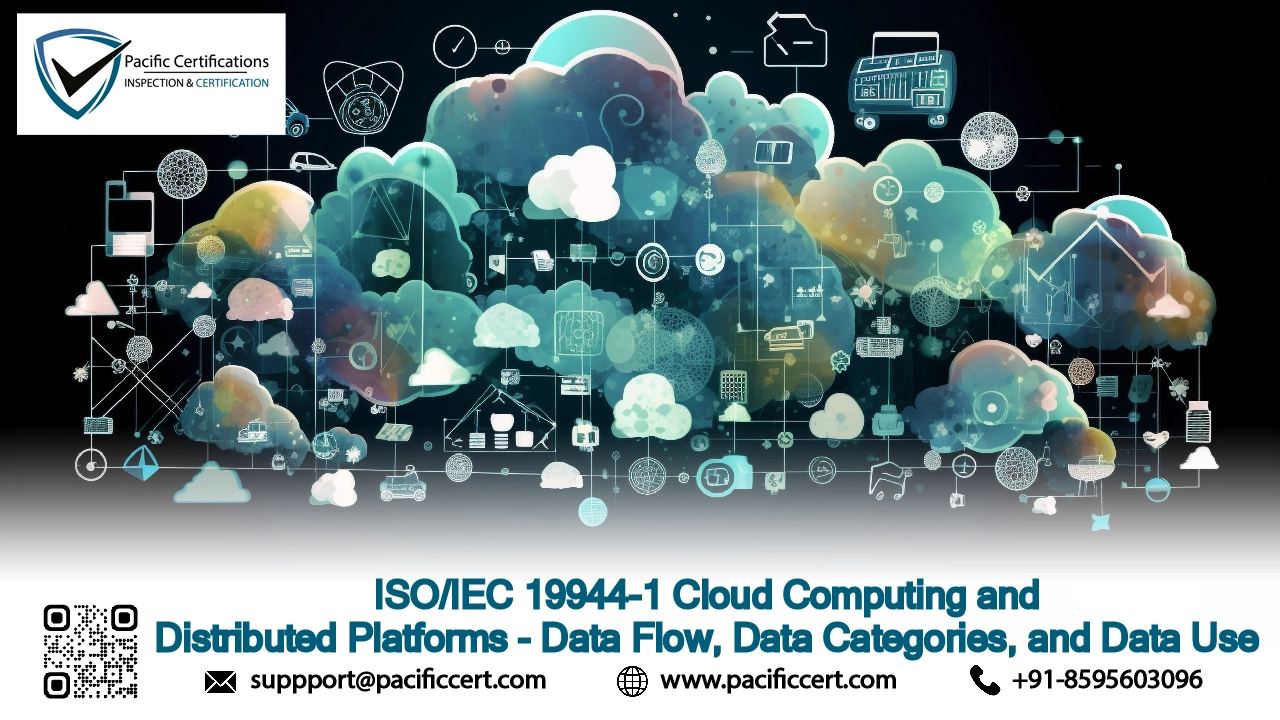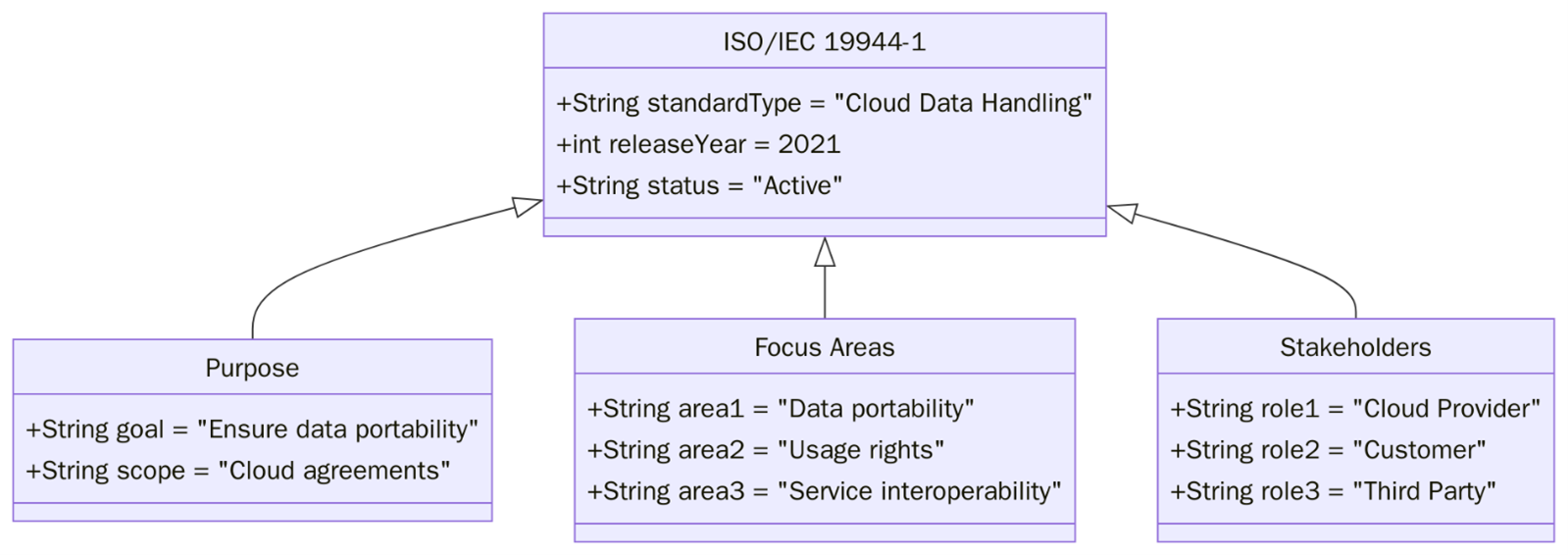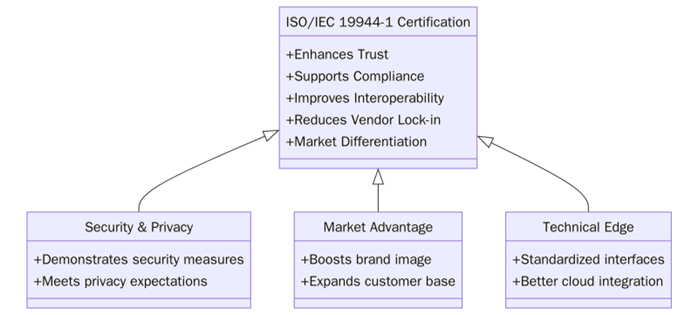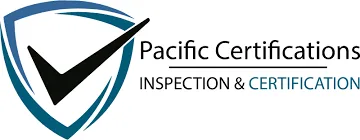What is ISO/IEC 19944-1?

ISO/IEC 19944-1 is a standard that focuses on the data flow, data categories, and data usage within cloud computing and distributed platforms. The standard aims to provide guidelines to organizations and service providers on how to manage, process, and protect data as it flows across cloud environments. ISO/IEC 19944-1 helps organizations understand and implement smooth data management strategies that address various types of data used in cloud computing, ensuring that the data flows securely and complies with international standards for data protection.
The standard outlines the data flow models, including the movement of data through different systems, applications, and environments. It categorizes the data involved in these processes and offers guidance on their usage and control, providing a framework for data protection and management that aligns with legal, regulatory, and organizational requirements.
For more information, contact us at support@pacificcert.com.
Purpose of ISO/IEC 19944-1
The primary purpose of ISO/IEC 19944-1 is to establish guidelines for understanding and managing the data involved in cloud computing and distributed platforms. The standard provides a structured approach to classify data based on its flow, use, and categories, which helps organizations establish clearer policies on how data should be handled throughout its lifecycle.

This standard supports organizations in mitigating data-related risks, improving data management practices, and ensuring compliance with data protection laws. It enables service providers to align their data handling practices with industry standards while ensuring transparency and accountability in their data processing activities. Additionally, it serves as a vital tool for businesses operating in cloud environments by improving the clarity around how data should be securely shared, transferred, and stored.
Scope and Applicability
ISO/IEC 19944-1 applies to all organizations that operate in the cloud computing and distributed platform environments, including businesses providing cloud services and those integrating cloud platforms into their operations. The scope of this standard is particularly relevant for organizations that handle sensitive or high-volume data across cloud infrastructure, including industries such as healthcare, finance, e-commerce, telecommunications, and government.
The standard is applicable to cloud service providers, data controllers, and any entity engaged in the processing, storage, or transmission of data in distributed environments. It covers data flow management, including the tracking of data from its point of creation through to its storage, transfer, and eventual deletion. By adopting the guidelines in ISO/IEC 19944-1, organizations can ensure they adhere to international data protection regulations and improve overall data governance in the cloud.
Key Definitions
- Data Flow: The movement of data across systems, networks, and cloud environments, including how data is shared and transferred between applications, devices, and users.
- Data Categories: The classification of data based on its sensitivity, confidentiality, and usage. This could include personal data, financial data, operational data, and more.
- Data Use: The specific ways in which data is accessed, processed, and utilized within a system, application, or service.
- Data Governance: The policies, procedures, and practices put in place to ensure data is accurately managed, protected, and used in compliance with regulatory requirements.
- Cloud Services: On-demand services provided via the internet, such as data storage, computing, networking, and software applications.
Clause-wise structure of ISO/IEC 19944-1
ISO/IEC 19944-1 is structured into several clauses, each addressing specific aspects of data flow, categories, and data use. Below is the clause-wise breakdown:
Clause Number | Title | Description |
Clause 1 | Scope | Defines the scope of the standard, specifying the types of data flow and systems covered under the guidelines. |
Clause 2 | Normative References | Lists the relevant standards and documents referenced within ISO/IEC 19944-1 to ensure overreaching compliance. |
Clause 3 | Terms and Definitions | Provides definitions of key terms related to data flow, categories, and use within cloud computing environments. |
Clause 4 | Governance of Data Flow | Discusses how organizations should manage data flow across cloud platforms to ensure consistency, security, and compliance. |
Clause 5 | Classification of Data | Details how data should be categorized based on sensitivity and regulatory requirements. |
Clause 6 | Data Protection and Security | Outlines security measures that need to be implemented for the protection of data, including encryption and access control. |
Clause 7 | Compliance with Legal and Regulatory Frameworks | Describes how to ensure compliance with international and local data protection laws when managing data in the cloud. |
Clause 8 | Monitoring and Auditing Data Flow | Covers methods for tracking and auditing data flows to ensure continuous compliance and mitigate potential risks. |
What are the requirements of ISO/IEC 19944-1?
ISO/IEC 19944-1 provides several requirements that must be met by organizations to ensure effective management of data in cloud environments. These requirements focus on the secure and responsible flow of data, maintaining data privacy, and ensuring legal compliance. The critical requirements for organizations include:

- Establish a clear governance framework for managing data flow, ensuring that all data activities comply with organizational policies and legal requirements.
- Implement a classification system that categorizes data based on its sensitivity, ensuring that appropriate security measures are applied to each data category.
- Encrypt sensitive data, restrict access, and implement other data protection controls to ensure the integrity and confidentiality of data.
- Ensure that all data handling practices are aligned with relevant local and international regulations, such as GDPR, HIPAA, or CCPA.
- Develop protocols for securely sharing data between systems and organizations, ensuring data flow is properly monitored and controlled.
- Regularly monitor and audit data flows to ensure compliance with the standard and detect any potential risks or breaches.
For more information, contact us at support@pacificcert.com.
Audit Checklist
The audit checklist for ISO/IEC 19944-1 typically includes the following elements:
- Have cloud roles and responsibilities between the provider and customer been clearly defined and documented?
- Is virtual machine configuration securely managed and isolated in multi-tenant cloud environments?
- Are procedures in place for the secure return, deletion, or migration of customer assets after contract termination?
- Is administrative access by cloud service customers properly controlled and monitored by the provider?
- Are cloud-specific security requirements addressed in the service agreement (data location, jurisdiction etc.)?
- Is customer activity within the cloud environment logged, monitored, and reviewed for anomalies?
- Are customers informed of any changes that may affect cloud service security controls or SLAs?
- Are measures implemented to segregate and protect customer data in shared infrastructure setups?
- Is there a documented process for handling cloud-specific incidents and notifying affected parties?
What are the benefits of ISO/IEC 19944-1 Certification?
Adopting ISO/IEC 19944-1 brings several benefits to organizations, particularly those dealing with cloud computing and distributed platforms. Below are some of the key benefits of certification:

- Certification ensures that all sensitive data flowing through cloud systems is protected with the necessary security measures.
- Achieving certification shows that the organization complies with international data protection laws, such as GDPR and CCPA.
- Organizations that show strong data management practices gain trust from customers, partners, and regulators.
- Standardizing data flow processes ensures that data is consistently handled, improving operational efficiency.
- By monitoring data flows and categorizing data, organizations can identify and mitigate risks proactively.
The demand for cloud security solutions continues to increase as businesses migrate more operations online. ISO/IEC 19944-1 is increasingly seen as a critical tool for managing secure data flows, particularly as more organizations implement cloud services and distributed computing solutions.
Additionally, the growing focus on data privacy regulations such as GDPR and CCPA is pushing companies to adopt international standards like ISO/IEC 19944-1 to ensure compliance. The demand for ISO/IEC 19944-1 will rise as businesses need clear guidelines to manage sensitive data and comply with tightening regulations.
Certification Process for ISO/IEC 19944-1
The certification process involves the following stages:
- Initial Assessment: Review current data management processes and identify any gaps in compliance.
- Documentation Review: Ensure that all required data flow documentation, including data classification, governance protocols, and security measures, is in place.
- Audit by a Certification Body: An independent auditor reviews the data flow processes and ensures compliance with ISO/IEC 19944-1.
- Certification Awarded: Upon successful audit, the organization is awarded certification for ISO/IEC 19944-1.
- Ongoing Surveillance: Regular audits are conducted to ensure continuous compliance.
Timeline for ISO/IEC 19944-1 Certification
The timeline for certification involves several phases. Preparation takes1-2 months for assessment, documentation gathering, and implementation of security measures. Audit takes another 1-2 months for the auditing process. Certification usually happens in 1 month after the audit. Ongoing Surveillance are the Annual audits to ensure continued compliance
What is the cost of ISO/IEC 19944-1 Certification?
The cost of ISO 19944 certification varies based on factors such as the size of the pipeline system, its complexity, and the number of facilities involved. Costs include Audit Fee which is the Fee for the certification body’s audit process. Training costs are the costs for educating staff on GDP Certification and the necessary processes for compliance. Ongoing maintenance are the costs for regular audits and recertification required every 3 years.
How Pacific Certifications Can Help?
At Pacific Certifications, we provide overreaching auditing and certification services for ISO/IEC 19944-1. Our team will guide you through the entire certification process, ensuring that your organization meets all the necessary data flow management requirements. Our services include:
- Stage 1 and Stage 2 audits to evaluate your data management practices and ensure compliance.
- Objective conformity assessments based on ISO/IEC 19944-1.
- Certification issuance upon successful completion of the audit.
- Ongoing surveillance audits to ensure continued compliance.
For audits and certification, contact support@pacificcert.com.
ISO 9001 and ISO/IEC 19944-1 Training and Courses
Various training courses are available to help organizations comply with ISO/IEC 19944-1, including:
- Lead Auditor Training – Equips professionals to conduct external third-party audits.
- Lead Implementer Training – For those responsible for planning and executing ISO 19944 implementation.
- Internal Auditor Training – Preparing internal auditors for certification audits
Pacific Certifications provides accredited training programs. If your organization is looking for ISO/IEC 19944-1 training, our team is equipped to help you. Contact us at support@pacificcert.com.
Frequently Asked Questions (FAQs)
How long does it take to get ISO/IEC 19944-1 certification?
The certification process typically takes 3-6 months, depending on your organization’s preparedness and audit outcomes.
Is ISO/IEC 19944-1 certification mandatory for all cloud service providers?
ISO/IEC 19944-1 certification is not mandatory, but it is highly recommended for organizations handling sensitive data in cloud computing environments.
What are the main benefits of ISO/IEC 19944-1 certification?
Certification improves data security, improves compliance with privacy regulations, reduces risks, and builds trust with customers.
Can I apply for ISO/IEC 19944-1 certification without a data management system in place?
No, a strong data management system must be in place before applying for certification.
How often do I need to renew ISO/IEC 19944-1 certification?
ISO/IEC 19944-1 certification is valid for three years, after which recertification is required.
Contact Us
If you need support with ISO/IEC 19944-1 certification, contact us at support@pacificcert.com.
Read More at: Blogs by Pacific Certifications






